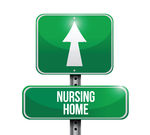
Families may care for their loved one at home for as long as possible, or the senior may remain at home independently with caregivers coming into the home or at an assisted living community. Sometimes, due to aging and illness, it may become necessary to consider nursing home care because home care is no longer appropriate. Below are some signs that the current level of senior living and care no longer meets the needs of your loved one.
- Worsening Health/Chronic Illness
If your loved one is suffering from health issues that continue to worsen, it may become increasingly difficult for their caregiver(s) to keep up with their care. Severe medical issues may require a higher level of care that can’t be given at home.
- Excessive Difficulties with Daily Living Skills
Your loved one may begin having sufficient difficulties with daily skills, such as bathing, toileting and dressing him/herself. Early on, it may be possible for them to continue to live independently with a caregiver to assist them with these things, but aging, illness and mobility issues may make it more difficult for these tasks to be completed.
- Caregiver’s Health is Declining
If your loved one is living with a family member/caregiver, the person providing the care may experience significant strain to his/her health, due to the constant demands of caring for an aging/ill adult. The caregiver may develop significant health issues of his/her own that may prevent him/her from being able to care for others. If there is no one else who is able to care for your loved one, then it may be necessary to consider nursing home care.
- The Caregiver Can No Longer Manage the Demands of the Senior’s Illness and Declining Health
The strain of caring for a loved one may become increasingly difficult as his/her health declines. This may make it difficult for the caregiver to juggle their other responsibilities, such as family and work, while dealing with their loved one’s declining health.
- Financial Strain